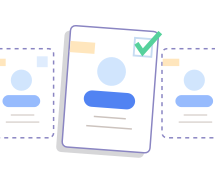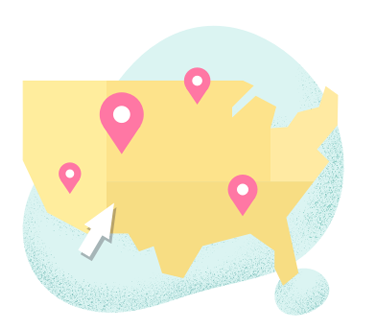

Find the right small business insurance

Enter your information just once, in one application

Compare business insurance quotes from top providers

Choose the best rate and coverage for your business
Top recommended small business insurance policies
These insurance policies cover the most common accidents, liability claims, and damages that could impact your small business.
General liability insurance
This policy covers third-party business risks including bodily injuries, property damage, and accidental copyright infringement. It's required for most commercial leases.
- Slip-and-fall accidents
- Damaged customer property
- Intellectual property and defamation lawsuits
Errors and omissions insurance
Also called professional liability insurance, errors and omissions insurance is common for professional services companies. It covers lawsuits related to your work performance.
- Coding errors
- Accusations of negligence
- Work mistakes and oversights
Workers’ comp insurance
Most states require workers' comp for companies that have employees. It also helps sole proprietors and independent contractors pay work-related medical costs that health insurance could deny.
- Employee medical expenses
- Disability benefits
- Lawsuits from work injuries
Business owner’s policy
A BOP bundles commercial property insurance and general liability insurance under one plan. It's often the most cost-effective type of commercial insurance for small business owners.
- Customer injuries
- Damaged business property
- Business interruption incidents
Cyber liability insurance
This policy helps businesses survive data breaches and cyberattacks. It pays for notification costs when credit card numbers or other customer data are exposed.
- Data breach lawsuits
- Customer notification expenses
- Fraud monitoring costs
Professional liability insurance
This policy, also called errors and omissions insurance (E&O), protects small businesses that provide professional services or advice. It covers lawsuits related to work performance.
- Work mistakes and oversights
- Professional negligence lawsuits
- Late or incomplete work
Learn more about business liability insurance.
Hear from business owners like you who purchased insurance coverage.
How much does business insurance cost?

From our customer data, here's a quick look at the median costs of common policies:
General liability: $42 per month
Errors & omissions: $61 per month
Workers' compensation: $45 per month
View more small business insurance costs.
Start a free application to see how much insurance will cost for your business.
Specialized coverage for unique risks
Businesses with expensive equipment, a board of directors, or extra liability concerns may need additional coverage.
Employment practices liability insurance
EPLI insurance coverage helps pay for legal expenses when an employee sues over discrimination, harassment, wrongful termination, or similar employment issues.
- Sexual harassment lawsuits
- Discrimination claims
- Mismanagement allegations
Directors and officers insurance
D&O insurance covers lawsuits related to decisions made by directors, officers, and board members on behalf of your company, including lawsuits from dissatisfied investors.
- Investor lawsuits over lack of transparency
- Accusations of mismanaged funds
- Failure to comply with regulations
Fidelity bonds
If an employee at your business steals from a client, this bond would provide compensation for the client. You may also see it called an employee dishonesty bond.
- Employee theft or fraud
- Unlawful data access by an employee
- Illegal funds transfer by an employee
Commercial property insurance
This type of insurance covers the value of a company's building and its contents, such as inventory, equipment, and furniture.
- Fires
- Theft and vandalism
- Weather damage
Business interruption insurance
Also called business income insurance, this policy covers lost revenue and other expenses when an event such as a fire temporarily disrupts your business operations. You can usually add it to commercial property insurance.
- Lost revenue
- Payroll and other day-to-day expenses
- Relocation costs
Commercial umbrella insurance
This policy boosts your current liability coverage when its limit is reached. It supplements general liability, commercial auto, and employer's liability insurance.
- Additional general liability coverage
- Additional commercial auto coverage
- Additional employer's liability coverage
Ready to explore policies for your business? Get quotes.
Which small business insurance policies does your state require?

Auto insurance for small businesses
Small businesses and independent contractors that own a business vehicle are required to purchase commercial auto insurance. You may need additional coverage for personal, rented, or leased vehicles used for work.
Commercial auto insurance
This policy can help pay for expenses after an accident involving a vehicle owned by your small business. You can extend it to include coverage for vehicle damage.
- Car accidents
- Theft and vandalism
- Weather damage
Hired and non-owned auto insurance
HNOA covers a business’s liability in accidents that occur while driving leased vehicles, rentals, and employee-owned cars for company errands.
- Accidents in leased vehicles
- Accidents in rental cars
- Accidents in employee-owned vehicles
Common questions about small business insurance
What does small business insurance cover?
A small business should consider buying both property and liability insurance policies, which protect against different types of financial losses.
Business liability insurance helps cover costs when someone sues your company. It can help pay for legal defense costs, settlements, and court-ordered judgments. Commercial general liability insurance is the most common liability policy in any industry. It provides financial protection against slip-and-fall accidents and other risks from interacting with clients and customers.
Commercial property insurance can help pay for repair or replacement of your business property, including your building if you own it.
Compare policies and learn more about the different types of business insurance you might need.
Why do small businesses need insurance?
Business insurance provides financial protection against common accidents that could cost a lot of money to resolve. But you don't just need it for your own protection.
Landlords, lenders, clients, and the law might require you to carry business insurance. For example, general liability insurance is often required for a commercial lease, while state laws mandate workers' compensation insurance for businesses once they hire a certain number of employees.
Learn more about why you need business insurance.
How do I get a certificate of insurance?
It's easy to get a certificate of insurance for your small business with TechInsurance. These certificates are granted once you purchase an insurance policy, and you can use them to provide proof of coverage.
Simply fill out our easy online application, which asks for basic facts about your company. You'll receive free quotes from top-rated insurance carriers in minutes. Compare quotes and choose a policy, then pay the premium online. Once you've bought a policy, you can download a certificate by logging in to TechInsurance.
You can typically get your certificate of insurance the same day you apply for free quotes. A licensed insurance agent will help you every step of the way.
Do you offer insurance for my business?
TechInsurance has extensive expertise insuring technology businesses, and we insure small businesses in multiple other industries, such as construction and cleaning.
We also offer coverage for a wide range of business structures. That includes:
- Freelancers
- Independent contractors
- Limited liability companies (LLCs)
- S corporations
- Sole proprietors
- Startups
Learn how to choose the right legal structure for your business.